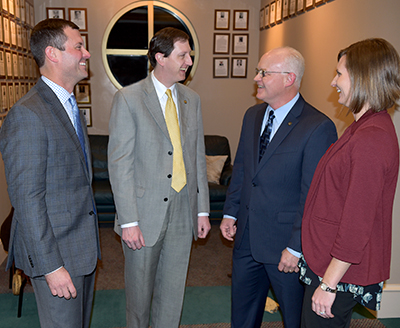Rural Broadband a Focus for Government Leaders

Expanding rural broadband internet access will be a focus of government leaders in 2018, as the Alabama Senate and Gov. Kay Ivey have made it a priority, and President Donald Trump recently signed executive orders related to the effort.
During her State of the State address Tuesday, Ivey called on the Alabama Legislature to send her bills to improve connectivity in rural areas.
“Though we are almost two decades into the 21st Century, many of our rural communities do not have adequate access to broadband,” Ivey said. “Adequate broadband enhances educational opportunities, increases economic development prospects and develops critical communication systems. I strongly support legislation to encourage new broadband investments, and I ask the Legislature to join me in assessing our state’s broadband needs, to ensure resources are placed where they are most needed.”
The Alabama Senate Republican Caucus also made broadband one of four priorities in its “Fighting for Alabama” legislative agenda.
“By providing incentives to telecom companies to invest in rural Alabama, we will ensure all of our citizens have fast and reliable access to the internet,” said their agenda released by President Pro Tem Del Marsh, R-Anniston. “Studies show that faster internet leads to more investment and higher paychecks.”
Sen. Clay Scofield, R-Red Hill, has introduced a bill to encourage investment in rural broadband. SB 149 has 24 co-sponsors. It would provide a 10-percent income tax credit to companies or cooperatives investing in broadband expansion and allow the exemption of new qualifying facilities from the state portion of property tax. Total income tax credits issued in any one year could not exceed $20 million. Limits would also apply to the amount of credit any one taxpayer could receive, based on their tax liability and the speed of internet services provided.
Scofield said his bill will help Alabama’s less populated areas reap the benefits of a growing economy.
“Rural Alabama has been left behind,” he said. “We have supported legislation in the last decade to help our larger cities; now it’s our time.”
While the House of Representatives Republican Caucus did not specify broadband expansion in its agenda, its “Flag, Family and Country” legislative agenda supports rural economic development.
“Rural Alabama is the backbone of our state, and citizens who live outside major metropolitan areas need the same access to jobs, opportunities and infrastructure as those in more populous regions,” their agenda states. “For those reasons, House Republicans pledge to focus upon and consider bills, programs and initiatives intended to provide rural Alabamians with more economic development and quality-of-life resources.”
Expanding broadband also was on the mind of President Donald Trump when addressed 4,000 members of the American Farm Bureau Federation Monday at their annual convention in Nashville.
“Last April, I commissioned a task force to meet with farmers and local communities and find the greatest barriers to rural prosperity,” Trump said. “The task force heard from farmers that broadband internet access is an issue of vital concern to their communities and businesses.”
Trump signed two presidential orders at the conference to “provide broader, faster—and better—internet coverage.”
The first instructs the U.S. Department of Interior to dedicate a portion of its assets for rural broadband installation. The second will streamline the installation process by requiring agencies to use standardized forms and contracts for installing antennas on federal buildings, thus improving process efficiency.
